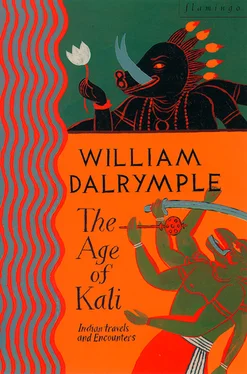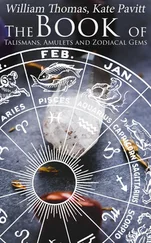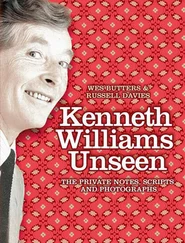Towards midnight, as he was leaving, Mahmudabad asked whether I was busy the following day. If not, he said, I was welcome to accompany him to the qila , his ancestral fort in the country outside Lucknow. He would be leaving at eleven a.m.; if I could get to him by then I could come along and keep him company on the journey.
Suleiman’s Lucknow pied à terre , I discovered the following morning, turned out to be the one surviving wing of the Kaiserbagh, the last great palace of the Nawabs. Before its partial destruction during the Mutiny, the Kaiserbagh had been larger than the Tuileries and the Louvre combined; but what remained more closely resembled some crumbling Sicilian palazzo , all flaking yellow plasterwork and benign baroque neglect. An ancient wheelless Austin 8 rusted in the palace’s porte-cochère, beside which squatted a group of elderly retainers all dressed in matching white homespun.
Suleiman was in his study, attending to a group of petitioners who had come to ask favours. It was an hour before he could free himself and call for the driver to come round with the car. Soon we had left the straggling outskirts of Lucknow behind us and were heading on a raised embankment through long, straight avenues of poplars. On either side spread yellow fields of mustard, broken only by clumps of palm and the occasional pool full of leathery water buffaloes. As we drove Suleiman talked about his childhood, much of which, it emerged, had been spent in exile in the Middle East.
‘My father,’ he said, ‘was a great friend of Jinnah and an early supporter of his Muslim League. In fact he provided so much of the finance that he was made treasurer. But despite his admiration for Jinnah he never really seemed to understand what Partition would entail. The day before the division, in the midst of the bloodshed, he quietly left the country and set off via Iran for Kerbala [the Shias’ holiest shrine] in Iraq. From there we went to Beirut. It was ten years before he took up Pakistani citizenship, and even then he spent most of his time in London.’
‘Did he regret helping Jinnah?’
‘He was too proud to admit it,’ said Suleiman, ‘but I think yes. Certainly he was profoundly saddened by the bitterness of Partition and the part he had played in bringing it about. After that he never settled down or returned home. I think he realised how many people he had caused to lose their homes, and he chose to wander the face of the earth as a kind of self-imposed penance.’
Mahmudabad lay only thirty miles outside Lucknow, but so bad were the roads that the journey took over two hours. Eventually a pair of minarets reared out of the trees – a replica of the mosque at Kerbala built by Suleiman’s father – and beyond them, looking on to a small lake, towered the walls of the qila of Mahmudabad.
It was a vast structure, built in the same Lucknavi Indo-Palladian style I had seen at La Martiniere and Dilkusha. The outer wall was broken by a ceremonial gateway or naqqar khana (drum house), on which was emblazoned the fish symbol of the Kingdom of Avadh. Beyond rose the ramparts of a medieval fort on to which had been tucked an eighteenth-century classical bow front; above, a series of balconies were surmounted by a ripple of Moghul chattris and cupolas.
It was magnificent; yet the same neglect which had embraced so many of the buildings of Lucknow had taken hold of the Mahmudabad qila . The grass had died on the lawn in front of the gateway, and the remaining flowers in the beds were twisted and desiccated; bushes sprouted from the fort’s roof. In previous generations the chamber at the top of the naqqar khana would have been full of musicians announcing the arrival of the Rajah with kettle drums and shenai . It was empty now, of course, but there was certainly no shortage of servants to fill it. As we drove in to the qila ’s courtyard a crowd of between twenty and thirty retainers was massed to greet the Rajah, all frantically bowing and salaam ing; as Suleiman got out of the car the foremost ones dived to touch his feet.
I followed him in to the qila and up through the dark halls and narrow staircases of the fort; the troop of servants followed behind me. Dust lay thick underfoot, as if the qila was some lost castle in a forest in a child’s fairy tale. We passed through a splintered door in to an old ballroom, empty, echoing and spacious. Once its floor had been sprung, but now many of the planks were missing, and others were littered with pieces of plaster fallen from the ceiling. A torn family portrait of some bejewelled Rajah hung half in, half out of its frame. It looked as if no one had entered the room for at least a decade.
Suleiman threw back a door and led the way in to what had once been the library. Cobwebs hung like sheets from the walls; the chintz was literally peeling off the armchairs. Books were everywhere, great piles of 1920s hardbacks, but you had to wipe them with a handkerchief to read their spines and to uncover lines of classics – The Annals of Tacitus, The Works of Aristotle – nestling next to such long-forgotten titles as The Competition Wallah and The Races of the North-West Provinces of India .
‘This library was my ancestors’ window on the world,’ said Suleiman. ‘But, like everything, it’s fast decaying, as you can see.’
I looked around. There were no carpets on the floors, which, uncovered, had become stained and dirty. Above there were holes in the ceiling, with the wooden beams showing through the broken plaster like bones sticking out of wounded flesh. Suleiman was at the window now, pressing the shutters to try to open them; pushing too hard, he nearly succeeded in dislodging the whole window frame. Eventually the shutter gave way and hung open, precariously attached to the frame by its one remaining hinge.
A servant padded in and Suleiman ordered some cold drinks, asking when lunch would be ready. The servant looked flustered. It became apparent that the message had not reached them from Lucknow that we would be expecting lunch; probably the telephone lines were not working that day.
‘It wasn’t always like this,’ said Suleiman, slumping down in one of the moth-eaten armchairs underneath a single naked lightbulb. ‘When the 1965 Indo–Pakistani war broke out, the qila was seized by the government as enemy property. My father had finally made the decision to take Pakistani citizenship in 1957, and although he had never really lived there, it was enough. Everything was locked up and the gates were sealed. My mother – who had never taken Pakistani citizenship – lived on the verandah for three or four months before the government agreed to allow her to have a room to sleep in. Even then it was two years before she was allowed access to a bathroom. She endured it all with great dignity. Until her death she carried on as if nothing had happened.’
At this point the bearer reappeared and announced that no cold drinks were available. Suleiman frowned and dismissed him, asking him to bring some water and to hurry up with the lunch.
‘What was I saying?’ he asked, distracted by the domestic chaos.
‘About the sealing of the palace.’
‘Ah, yes. The Indian Armed Constabulary lived here for two years. It wasn’t just neglect: the place was looted. There were two major thefts of silver – they said ten tons in all …’
‘Ten tons? Of silver?’
‘That’s what they say,’ replied Suleiman dreamily. He looked at his watch. It was nearly three o’clock and his absent lunch was clearly on his mind. ‘Ten tons … though it’s probably exaggerated. Certainly everything valuable was taken: even the chairs were stripped of their silver backing.’
Читать дальше












